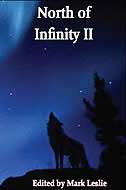“State of Disorder” by Douglas Smith
 “Pas de Deux” by Stephen Graham King
“Pas de Deux” by Stephen Graham King“The Identity Factory” by Andrew Weiner
“Shadows” by Karen Danylak
“I Found Love on Channel 13” by Bruce Golden
“Metal Fatigue” by Nancy Kilpatrick
“Son of Sun” by A.M. Matte
“Lumps” by Robert H. Beer
“Confessions of Me: Betrayer of Humanity” by Zohar A. Goodman
“Forever” by Robert J. Sawyer
“The Sum of Their Parts” by Stephanie Bedwell-Grime
“Walter’s Brain” by Kimberly Foottit
I will make no bones about it. North of Infinity II, edited by Mark Leslie, is the second best anthology I’ve read this year. (The first is Escape From Earth, reviewed here.) Since many of the tales run just a few pages, I can’t go into great detail about them. However, I hope that by the end of this review, you too shall be convinced that this Canadian collection deserves a place in your “To Read” pile.
First up, we have “State of Disorder” by Douglas Smith. With a cast of three (two rival scientists and a woman) and a limited setting (the same dinner party, although at different times), Smith explores the possibilities for revenge and manipulation inherent in time travel. The claustrophobic atmosphere of this tale heightens its devilish suspense and draws favorable comparisons to Poe’s tales of trapped, desperate protagonists.
In “Pas de Deux” by Stephen Graham King, a man with cancer contemplates a new, controversial treatment for his condition: transferring it to a heinous criminal as punishment so that the formerly cancerous person can live disease-free. While this situation is rife with tension, King chooses to do more describing of the obvious lineaments than examination of the implications. It’s good, but, with a little more flesh, it could have been so much more.
Andrew Weiner offers a humorous twist on Western civ’s self-help craze with “The Identity Factory.” Initially resistant to the fad of personality implants, Lou finally succumbs, discovering…well, less than he bargained for. Given the potentially horrific subject matter, the story’s resolution does seem a bit anticlimactic, but this is probably on account of my own preconceptions, because Weiner writes with engaging economy and high spirits, giving North of Infinity II a welcome light turn.
The next three stories—“Shadows” by Karen Danylak, “I Found Love on Channel 13” by Bruce Golden, and “Metal Fatigue” by Nancy Kilpatrick— remind me of the classic Twilight Zone, as do the following tales “Lump” by Robert H. Beer and “Sum of Their Parts” by Stephanie Bedwell-Grime. I say this not to dismiss or denigrate any of these shorts, but to praise them by comparison. Like the literary equivalents of those classic half-hour episodes of eerie black-and-white existential horror, each of these stories takes a simple concept (affair with a TV character in “Channel 13,” a world of men only in “Sum”), then escalates it quickly, deftly, and with originality. Kudos to the authors for executing a difficult form—short, almost flash, fiction—adeptly, and kudos to editor Leslie for choosing such effective pieces.
I want to spend a little more time with three stories in particular. First there’s A. M. Matte’s “Son of Sun.” It is a deceptively simple story about early humanoids and one of their major discoveries. I won’t say what the protagonist discovers because part of this story’s joy is the first-person way in which it immerses you in the animistic, magical thinking of the protagonist and her people. “Son of Sun” balances Promethean themes of myth (there, I just gave you another clue) with the decidedly personal as it shows how the heroine’s intelligence and creative thinking lead to great benefit for her tribe. Though it refers to psychic powers and though it’s highly speculative, “Son of Sun” rings convincing and true, and that’s why I deem it best of the book.
“Confessions of Me: Betrayer of Humanity” by Zohar A. Goodman is not technically a story. As you may divine from the rhythmical title, it’s more properly a prose poem. What happens when an orgasm of cosmic love strikes puny Earthling brains? Find out here, if you can penetrate the Rimbaudian fits of sometimes incomprehensible imagery. I still cannot decide whether the prose overwhelms the plot, or if it’s just a draw. “Confessions” won’t appeal to everyone, but try it. You might like it.
Finally, the spirit of Isaac Asimov hovers over the last story: “Walter’s Brain” by Kimberly Foottit. A lonely scientist strikes up a conversation with a dead genius’s brain, but, when a jealous coworker finds out, the expected disasters occur. I could see the ending coming pretty clearly, but the overall sweet tone and the understated character development draw you into this one. The ending, with scientist and genius in conversation, seems like a beginning, rather than an ending.